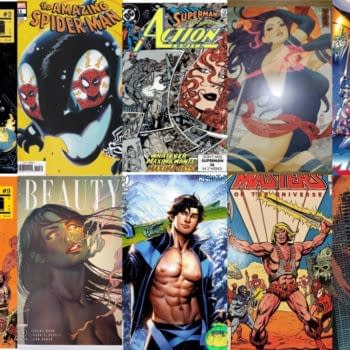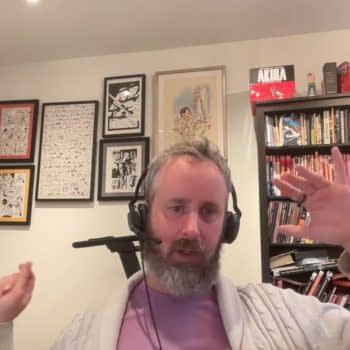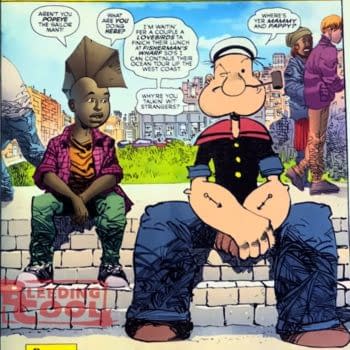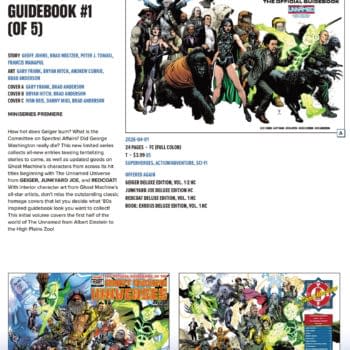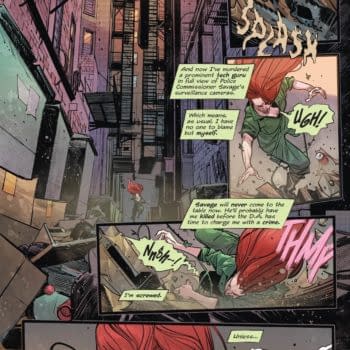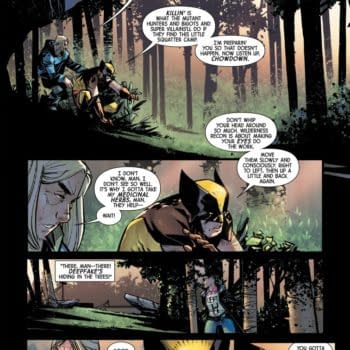Posted in: Comics, Recent Updates | Tagged:
Plus ça change, plus c'est la même chose
Joe Kelly, in 1999 about his decision to walk off the X-Men titles;
"We'd write a story, work really hard on it, hand it in and it would get approved. Then we'd get a call from the X-office saying, 'We're not doing that story any more'. We'd already put three months of work into it, but being professionals we'd go, 'Okay, we'll try and fight for it but if they don't like it, they don't like it'. So we'd do a new story and we'd go through the same thing over and over again. There'd be a situation, say, where a character did something a little bit dark, maybe flips out and beats the heck out of somebody. The editor would come back and say, 'I kinda see what you're doing, and it's kinda cool, but I don't really like that they beat somebody up at this point'. We were happy to say, 'Okay, we'll take that out and fix it, work around it'. But more often than not they'd just go, 'No, throw the whole thing out and try again'. We were continually working from a position of never knowing where we were; what story was going forward, what story wasn't.
Then we would get these sort of vague dictates like, 'I know you just wrote half an issue but there aren't enough X-Men in it, so put more X-Men in'. A concrete example of that is X-Men #75, which was supposed to be just the new characters [Marrow, Maggott and Dr. Cecilia Reyes] learning to work as part of a team. That's all the issue was supposed to be and everybody knew it. I was literally halfway through the script when I was told to put the other X-Men in it. I was like, 'Why?'. their response was, 'Because it's the X-Men and you need to show them as a group, and it's already been five issues and they haven't worked together as a real big team yet'. My argument to that was, 'We haven't set up that they should work together as a team yet'. I wanted to start with this step and build to the next. Of course, it's their characters, so I put all the X-Men in it, and I think it was a weaker story for that. I crammed in every character under the sun that I could fit. Everybody t! hat was at the mansion is in the story and half of the team has a pointless role. I tried to make it as cool as possible, but it was always after-the-fact coolness. That started happening regularly. You can only do that so many times before you start to go crazy.
Back in the old days, which are really only maybe five years ago, it didn't matter if you wrote a script three times, because the amount of money that was involved really made up for it. You could work only on X-Men and pay all your bills, but that was no longer the case when Steve [Seagle] and I were on the books; they weren't selling anywhere near the sort of numbers they used to. [The aforementioned X-Men #75 sold 146'000 copies according to Diamond, not counting reorders.] It's not just about money by any means, but when you're doing extra work it becomes about money, because you can't do other work. All of a sudden, you're in a situation where I might as well quit X-Men and work on two books, because it will be the same amount of money as if I worked on one issue of X-Men.
We tried all sorts of ways to iron out the communication process but nothing ever really worked, and we just kept getting frustrated. Then the anniversary story [Uncanny X-Men #360 and X-Men #80] really got butchered, that 'All New, All Deadly' story was not what we wanted. Once again, we tried to make it as good as possible but that Cerebro thing was not our idea; we wanted those new X-Men to be actual people, to be real characters, and we were told to make them holograms. We had no creative freedom.
The final straw was when it was time to do the 'Hunt for Xavier' story. We hammered that out and again it wasn't what they wanted, and we had problems. By the time we'd come up with something we could all agree on it was time to do the next big crossover story, which was this Magneto arc, and we were basically called up and told that the main office was gonna write the overall story for us and we were just going to execute it in the books. There are situations in which that works fine: soap operas and television series do it all the time. Except, that's how it has to be from the start. To go from, 'Hey, we want you guys to lend your voices to these books and make them different and unique', to 'We're gonna write the stories for you', you know you can't go any lower. We had to quit. It became a self-respect issue. This was a fight that we knew we couldn't win, because who do you argue with?
One of the comments we kept getting was, 'What's this thing about editorial interference? They're not interfering, they're doing their job'. I understand that point of view, and that Marvel owns these characters, so at the end of the day they can do whatever they want, but there's a difference between collaborative editing and interference. It's a line that may be fine and entirely subjective, but it was a line we felt was crossed."
Writers on Comics Scriptwriting. Mark Salisbury, Titan Books 1999









